Early Childhood Education and Care Curriculum Assessment CHC50113
VerifiedAdded on 2022/08/23
|31
|8715
|20
Homework Assignment
AI Summary
This document is a comprehensive guide to the Training & Assessment Cluster 5 Curriculum for the Diploma of Early Childhood Education and Care CHC50113 program. It outlines the assessment program, which focuses on designing, implementing, and evaluating curriculum in early childhood settings. The assessment covers knowledge and performance evidence, including understanding of the National Quality Framework and the Early Years Learning Framework (EYLF). It requires students to demonstrate skills in curriculum design, creating learning environments, fostering children's development, promoting sustainability, and engaging in reflective practice. The program emphasizes the importance of research, practical activities, and professional conversations to enhance educators' skills. Students are expected to engage with various resources, including the National Law & Regulations, the National Quality Standards, and workplace policies, to develop a strong understanding of early childhood education practices. The assessment includes units on supporting children's connection to the world, embedding sustainable practices, and designing and implementing curriculum to foster children's learning and development. Students are also required to allocate time for study, research, and directed activities to meet the assessment requirements. The document provides detailed instructions and resources to support students in their learning journey.
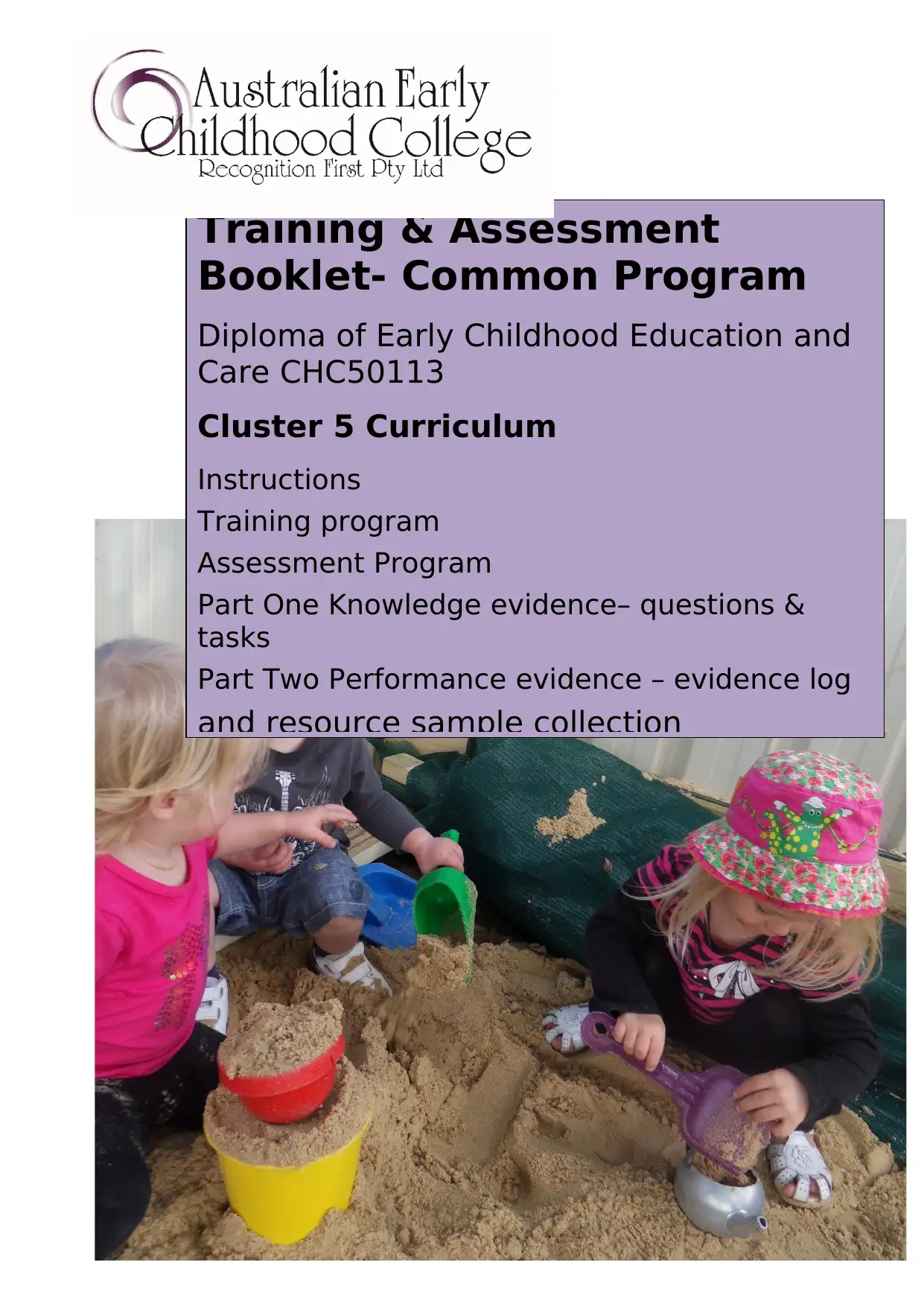
Training & Assessment
Booklet- Common Program
Diploma of Early Childhood Education and
Care CHC50113
Cluster 5 Curriculum
Instructions
Training program
Assessment Program
Part One Knowledge evidence– questions &
tasks
Part Two Performance evidence – evidence log
and resource sample collection
Booklet- Common Program
Diploma of Early Childhood Education and
Care CHC50113
Cluster 5 Curriculum
Instructions
Training program
Assessment Program
Part One Knowledge evidence– questions &
tasks
Part Two Performance evidence – evidence log
and resource sample collection
Paraphrase This Document
Need a fresh take? Get an instant paraphrase of this document with our AI Paraphraser
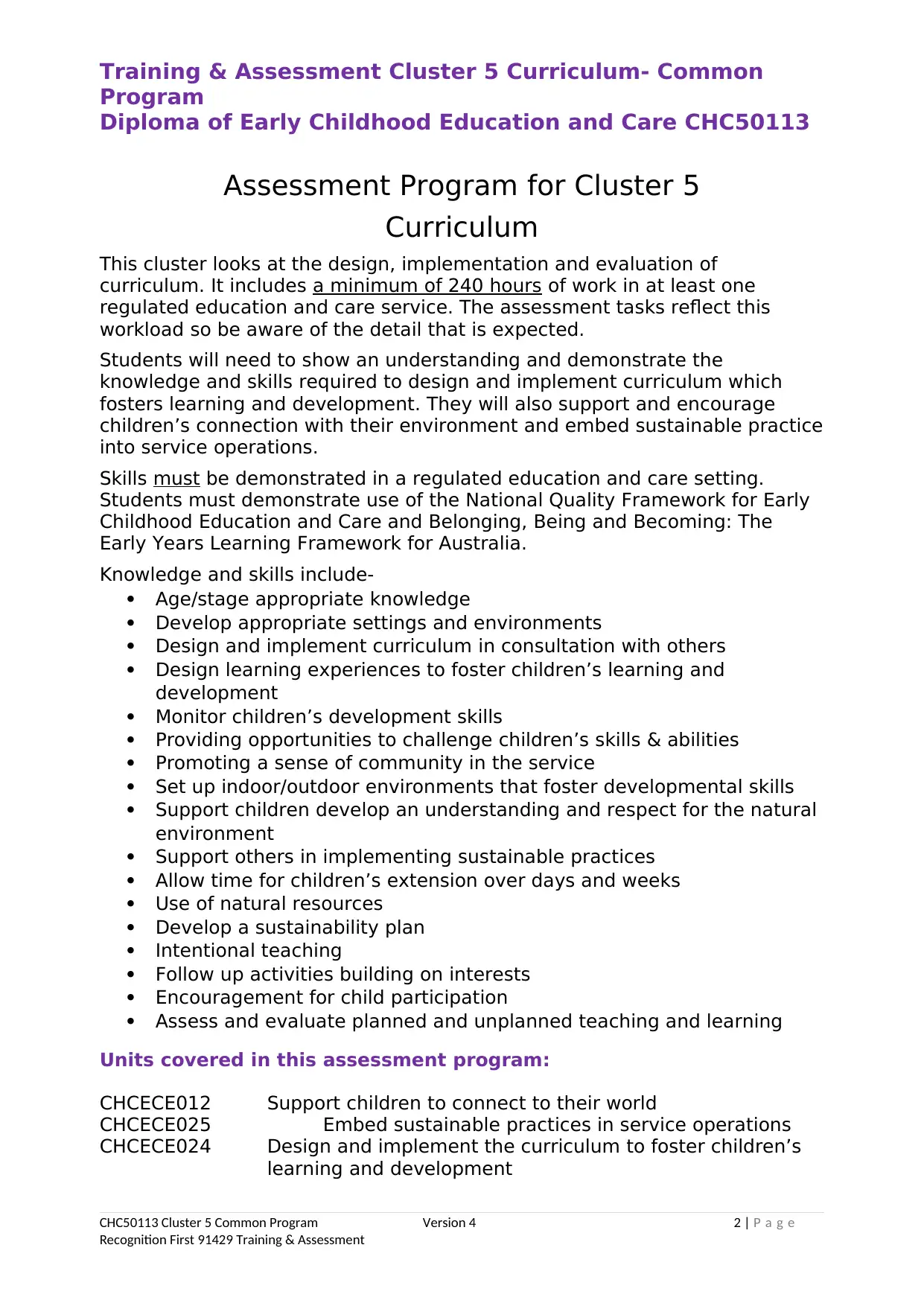
Training & Assessment Cluster 5 Curriculum- Common
Program
Diploma of Early Childhood Education and Care CHC50113
Assessment Program for Cluster 5
Curriculum
This cluster looks at the design, implementation and evaluation of
curriculum. It includes a minimum of 240 hours of work in at least one
regulated education and care service. The assessment tasks reflect this
workload so be aware of the detail that is expected.
Students will need to show an understanding and demonstrate the
knowledge and skills required to design and implement curriculum which
fosters learning and development. They will also support and encourage
children’s connection with their environment and embed sustainable practice
into service operations.
Skills must be demonstrated in a regulated education and care setting.
Students must demonstrate use of the National Quality Framework for Early
Childhood Education and Care and Belonging, Being and Becoming: The
Early Years Learning Framework for Australia.
Knowledge and skills include-
Age/stage appropriate knowledge
Develop appropriate settings and environments
Design and implement curriculum in consultation with others
Design learning experiences to foster children’s learning and
development
Monitor children’s development skills
Providing opportunities to challenge children’s skills & abilities
Promoting a sense of community in the service
Set up indoor/outdoor environments that foster developmental skills
Support children develop an understanding and respect for the natural
environment
Support others in implementing sustainable practices
Allow time for children’s extension over days and weeks
Use of natural resources
Develop a sustainability plan
Intentional teaching
Follow up activities building on interests
Encouragement for child participation
Assess and evaluate planned and unplanned teaching and learning
Units covered in this assessment program:
CHCECE012 Support children to connect to their world
CHCECE025 Embed sustainable practices in service operations
CHCECE024 Design and implement the curriculum to foster children’s
learning and development
CHC50113 Cluster 5 Common Program Version 4 2 | P a g e
Recognition First 91429 Training & Assessment
Program
Diploma of Early Childhood Education and Care CHC50113
Assessment Program for Cluster 5
Curriculum
This cluster looks at the design, implementation and evaluation of
curriculum. It includes a minimum of 240 hours of work in at least one
regulated education and care service. The assessment tasks reflect this
workload so be aware of the detail that is expected.
Students will need to show an understanding and demonstrate the
knowledge and skills required to design and implement curriculum which
fosters learning and development. They will also support and encourage
children’s connection with their environment and embed sustainable practice
into service operations.
Skills must be demonstrated in a regulated education and care setting.
Students must demonstrate use of the National Quality Framework for Early
Childhood Education and Care and Belonging, Being and Becoming: The
Early Years Learning Framework for Australia.
Knowledge and skills include-
Age/stage appropriate knowledge
Develop appropriate settings and environments
Design and implement curriculum in consultation with others
Design learning experiences to foster children’s learning and
development
Monitor children’s development skills
Providing opportunities to challenge children’s skills & abilities
Promoting a sense of community in the service
Set up indoor/outdoor environments that foster developmental skills
Support children develop an understanding and respect for the natural
environment
Support others in implementing sustainable practices
Allow time for children’s extension over days and weeks
Use of natural resources
Develop a sustainability plan
Intentional teaching
Follow up activities building on interests
Encouragement for child participation
Assess and evaluate planned and unplanned teaching and learning
Units covered in this assessment program:
CHCECE012 Support children to connect to their world
CHCECE025 Embed sustainable practices in service operations
CHCECE024 Design and implement the curriculum to foster children’s
learning and development
CHC50113 Cluster 5 Common Program Version 4 2 | P a g e
Recognition First 91429 Training & Assessment
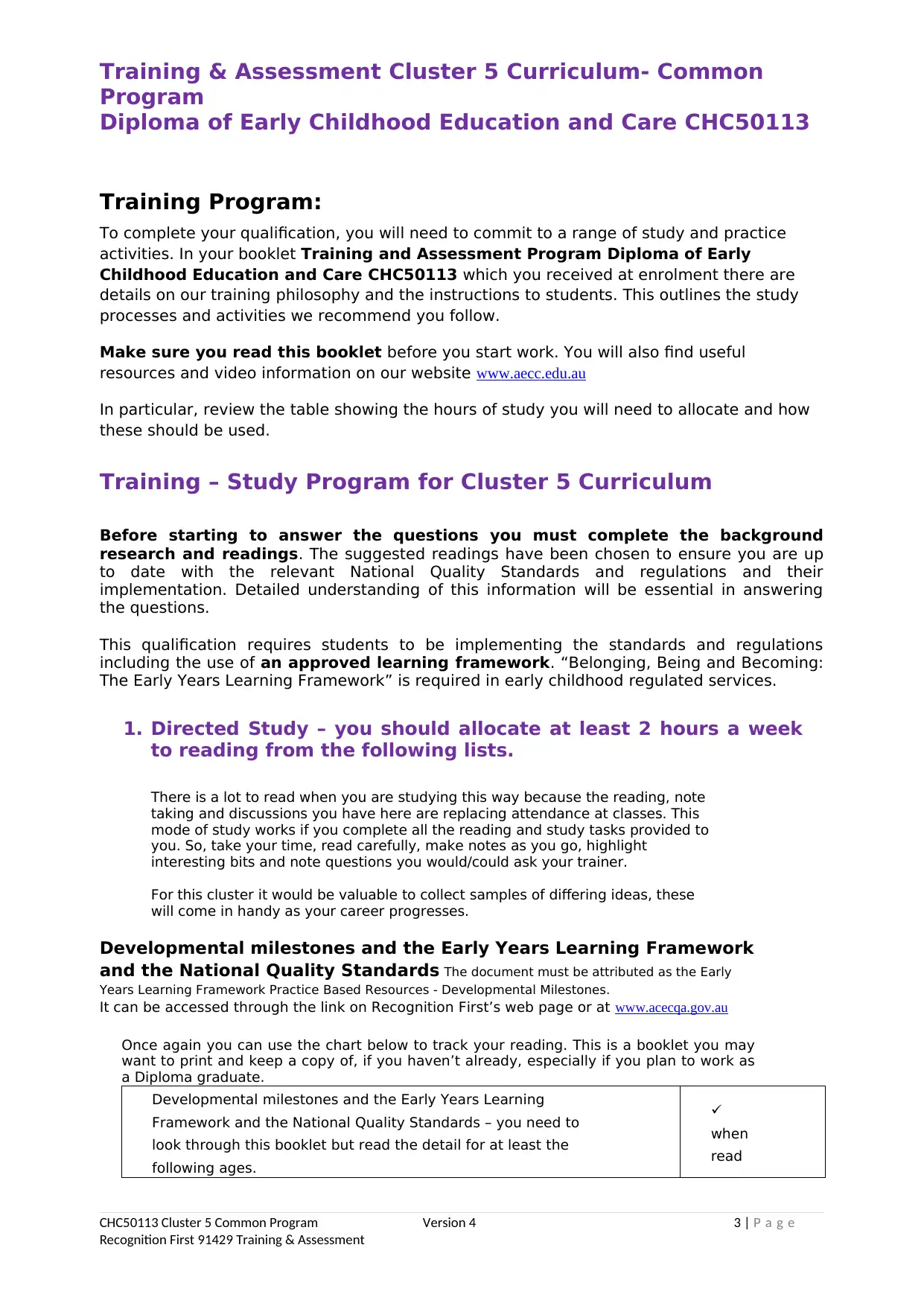
Training & Assessment Cluster 5 Curriculum- Common
Program
Diploma of Early Childhood Education and Care CHC50113
Training Program:
To complete your qualification, you will need to commit to a range of study and practice
activities. In your booklet Training and Assessment Program Diploma of Early
Childhood Education and Care CHC50113 which you received at enrolment there are
details on our training philosophy and the instructions to students. This outlines the study
processes and activities we recommend you follow.
Make sure you read this booklet before you start work. You will also find useful
resources and video information on our website www.aecc.edu.au
In particular, review the table showing the hours of study you will need to allocate and how
these should be used.
Training – Study Program for Cluster 5 Curriculum
Before starting to answer the questions you must complete the background
research and readings. The suggested readings have been chosen to ensure you are up
to date with the relevant National Quality Standards and regulations and their
implementation. Detailed understanding of this information will be essential in answering
the questions.
This qualification requires students to be implementing the standards and regulations
including the use of an approved learning framework. “Belonging, Being and Becoming:
The Early Years Learning Framework” is required in early childhood regulated services.
1. Directed Study – you should allocate at least 2 hours a week
to reading from the following lists.
There is a lot to read when you are studying this way because the reading, note
taking and discussions you have here are replacing attendance at classes. This
mode of study works if you complete all the reading and study tasks provided to
you. So, take your time, read carefully, make notes as you go, highlight
interesting bits and note questions you would/could ask your trainer.
For this cluster it would be valuable to collect samples of differing ideas, these
will come in handy as your career progresses.
Developmental milestones and the Early Years Learning Framework
and the National Quality Standards The document must be attributed as the Early
Years Learning Framework Practice Based Resources - Developmental Milestones.
It can be accessed through the link on Recognition First’s web page or at www.acecqa.gov.au
Once again you can use the chart below to track your reading. This is a booklet you may
want to print and keep a copy of, if you haven’t already, especially if you plan to work as
a Diploma graduate.
Developmental milestones and the Early Years Learning
Framework and the National Quality Standards – you need to
look through this booklet but read the detail for at least the
following ages.
when
read
CHC50113 Cluster 5 Common Program Version 4 3 | P a g e
Recognition First 91429 Training & Assessment
Program
Diploma of Early Childhood Education and Care CHC50113
Training Program:
To complete your qualification, you will need to commit to a range of study and practice
activities. In your booklet Training and Assessment Program Diploma of Early
Childhood Education and Care CHC50113 which you received at enrolment there are
details on our training philosophy and the instructions to students. This outlines the study
processes and activities we recommend you follow.
Make sure you read this booklet before you start work. You will also find useful
resources and video information on our website www.aecc.edu.au
In particular, review the table showing the hours of study you will need to allocate and how
these should be used.
Training – Study Program for Cluster 5 Curriculum
Before starting to answer the questions you must complete the background
research and readings. The suggested readings have been chosen to ensure you are up
to date with the relevant National Quality Standards and regulations and their
implementation. Detailed understanding of this information will be essential in answering
the questions.
This qualification requires students to be implementing the standards and regulations
including the use of an approved learning framework. “Belonging, Being and Becoming:
The Early Years Learning Framework” is required in early childhood regulated services.
1. Directed Study – you should allocate at least 2 hours a week
to reading from the following lists.
There is a lot to read when you are studying this way because the reading, note
taking and discussions you have here are replacing attendance at classes. This
mode of study works if you complete all the reading and study tasks provided to
you. So, take your time, read carefully, make notes as you go, highlight
interesting bits and note questions you would/could ask your trainer.
For this cluster it would be valuable to collect samples of differing ideas, these
will come in handy as your career progresses.
Developmental milestones and the Early Years Learning Framework
and the National Quality Standards The document must be attributed as the Early
Years Learning Framework Practice Based Resources - Developmental Milestones.
It can be accessed through the link on Recognition First’s web page or at www.acecqa.gov.au
Once again you can use the chart below to track your reading. This is a booklet you may
want to print and keep a copy of, if you haven’t already, especially if you plan to work as
a Diploma graduate.
Developmental milestones and the Early Years Learning
Framework and the National Quality Standards – you need to
look through this booklet but read the detail for at least the
following ages.
when
read
CHC50113 Cluster 5 Common Program Version 4 3 | P a g e
Recognition First 91429 Training & Assessment
⊘ This is a preview!⊘
Do you want full access?
Subscribe today to unlock all pages.

Trusted by 1+ million students worldwide
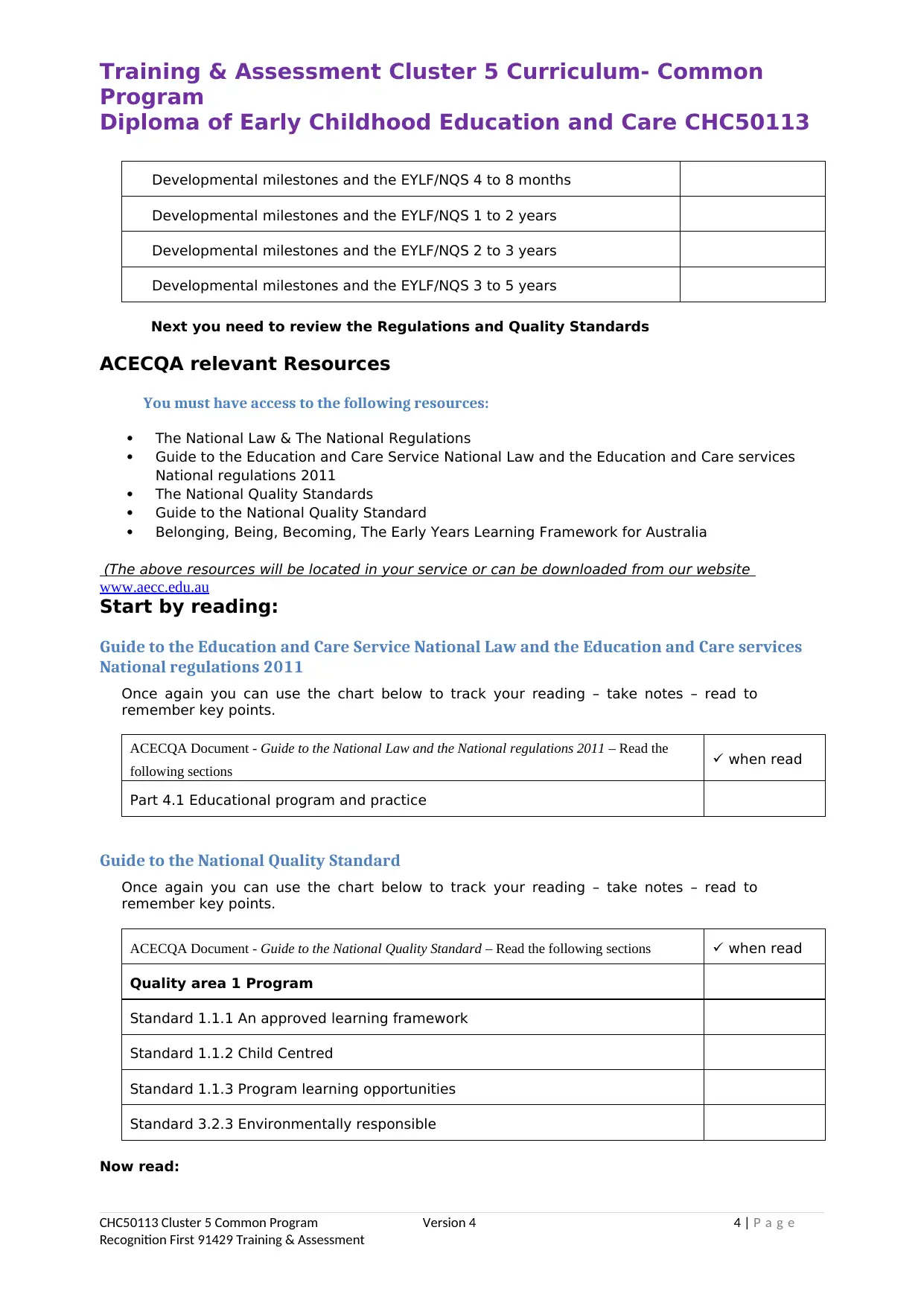
Training & Assessment Cluster 5 Curriculum- Common
Program
Diploma of Early Childhood Education and Care CHC50113
Developmental milestones and the EYLF/NQS 4 to 8 months
Developmental milestones and the EYLF/NQS 1 to 2 years
Developmental milestones and the EYLF/NQS 2 to 3 years
Developmental milestones and the EYLF/NQS 3 to 5 years
Next you need to review the Regulations and Quality Standards
ACECQA relevant Resources
You must have access to the following resources:
The National Law & The National Regulations
Guide to the Education and Care Service National Law and the Education and Care services
National regulations 2011
The National Quality Standards
Guide to the National Quality Standard
Belonging, Being, Becoming, The Early Years Learning Framework for Australia
(The above resources will be located in your service or can be downloaded from our website
www.aecc.edu.au
Start by reading:
Guide to the Education and Care Service National Law and the Education and Care services
National regulations 2011
Once again you can use the chart below to track your reading – take notes – read to
remember key points.
ACECQA Document - Guide to the National Law and the National regulations 2011 – Read the
following sections when read
Part 4.1 Educational program and practice
Guide to the National Quality Standard
Once again you can use the chart below to track your reading – take notes – read to
remember key points.
ACECQA Document - Guide to the National Quality Standard – Read the following sections when read
Quality area 1 Program
Standard 1.1.1 An approved learning framework
Standard 1.1.2 Child Centred
Standard 1.1.3 Program learning opportunities
Standard 3.2.3 Environmentally responsible
Now read:
CHC50113 Cluster 5 Common Program Version 4 4 | P a g e
Recognition First 91429 Training & Assessment
Program
Diploma of Early Childhood Education and Care CHC50113
Developmental milestones and the EYLF/NQS 4 to 8 months
Developmental milestones and the EYLF/NQS 1 to 2 years
Developmental milestones and the EYLF/NQS 2 to 3 years
Developmental milestones and the EYLF/NQS 3 to 5 years
Next you need to review the Regulations and Quality Standards
ACECQA relevant Resources
You must have access to the following resources:
The National Law & The National Regulations
Guide to the Education and Care Service National Law and the Education and Care services
National regulations 2011
The National Quality Standards
Guide to the National Quality Standard
Belonging, Being, Becoming, The Early Years Learning Framework for Australia
(The above resources will be located in your service or can be downloaded from our website
www.aecc.edu.au
Start by reading:
Guide to the Education and Care Service National Law and the Education and Care services
National regulations 2011
Once again you can use the chart below to track your reading – take notes – read to
remember key points.
ACECQA Document - Guide to the National Law and the National regulations 2011 – Read the
following sections when read
Part 4.1 Educational program and practice
Guide to the National Quality Standard
Once again you can use the chart below to track your reading – take notes – read to
remember key points.
ACECQA Document - Guide to the National Quality Standard – Read the following sections when read
Quality area 1 Program
Standard 1.1.1 An approved learning framework
Standard 1.1.2 Child Centred
Standard 1.1.3 Program learning opportunities
Standard 3.2.3 Environmentally responsible
Now read:
CHC50113 Cluster 5 Common Program Version 4 4 | P a g e
Recognition First 91429 Training & Assessment
Paraphrase This Document
Need a fresh take? Get an instant paraphrase of this document with our AI Paraphraser
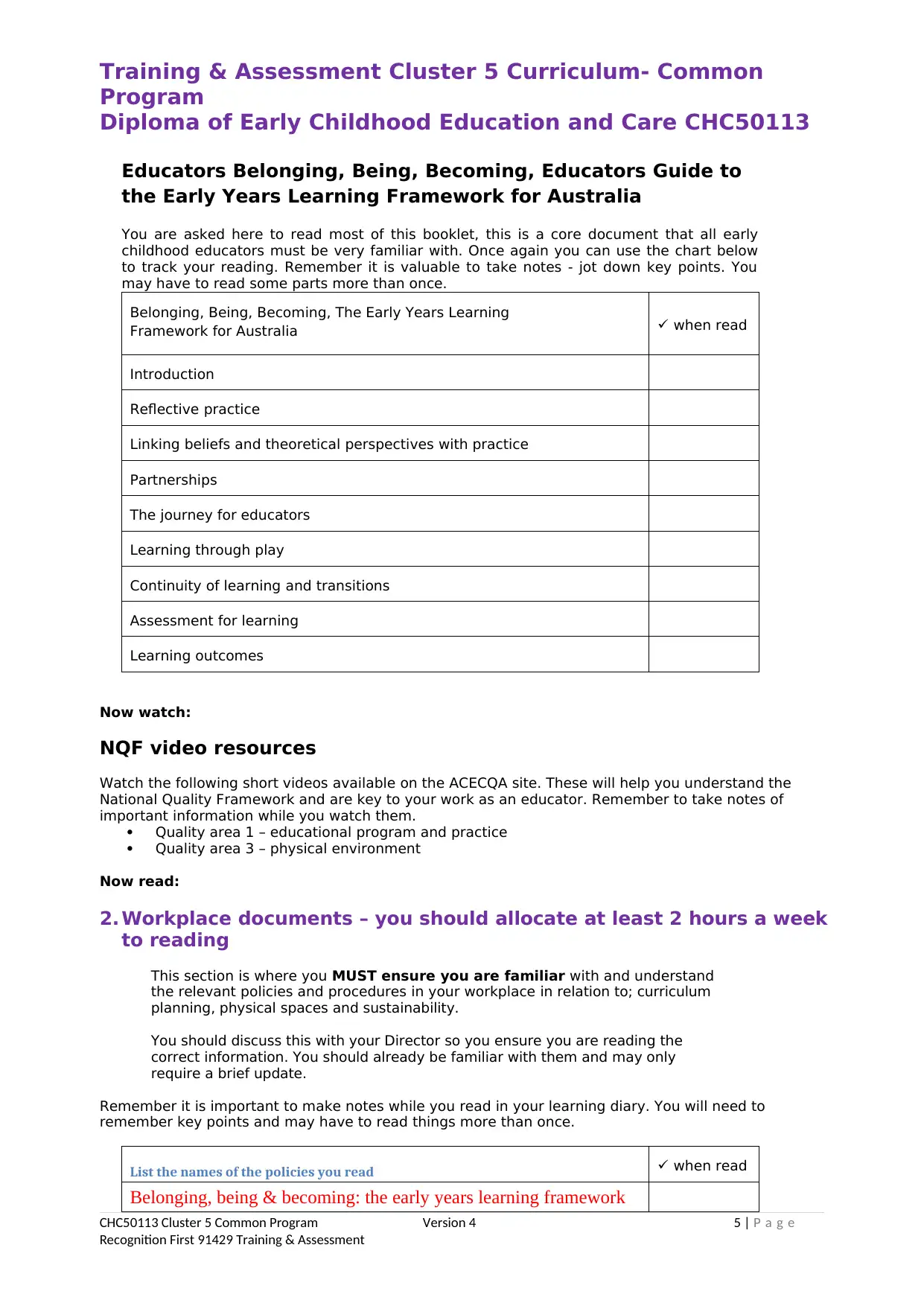
Training & Assessment Cluster 5 Curriculum- Common
Program
Diploma of Early Childhood Education and Care CHC50113
Educators Belonging, Being, Becoming, Educators Guide to
the Early Years Learning Framework for Australia
You are asked here to read most of this booklet, this is a core document that all early
childhood educators must be very familiar with. Once again you can use the chart below
to track your reading. Remember it is valuable to take notes - jot down key points. You
may have to read some parts more than once.
Belonging, Being, Becoming, The Early Years Learning
Framework for Australia when read
Introduction
Reflective practice
Linking beliefs and theoretical perspectives with practice
Partnerships
The journey for educators
Learning through play
Continuity of learning and transitions
Assessment for learning
Learning outcomes
Now watch:
NQF video resources
Watch the following short videos available on the ACECQA site. These will help you understand the
National Quality Framework and are key to your work as an educator. Remember to take notes of
important information while you watch them.
Quality area 1 – educational program and practice
Quality area 3 – physical environment
Now read:
2. Workplace documents – you should allocate at least 2 hours a week
to reading
This section is where you MUST ensure you are familiar with and understand
the relevant policies and procedures in your workplace in relation to; curriculum
planning, physical spaces and sustainability.
You should discuss this with your Director so you ensure you are reading the
correct information. You should already be familiar with them and may only
require a brief update.
Remember it is important to make notes while you read in your learning diary. You will need to
remember key points and may have to read things more than once.
List the names of the policies you read when read
Belonging, being & becoming: the early years learning framework
CHC50113 Cluster 5 Common Program Version 4 5 | P a g e
Recognition First 91429 Training & Assessment
Program
Diploma of Early Childhood Education and Care CHC50113
Educators Belonging, Being, Becoming, Educators Guide to
the Early Years Learning Framework for Australia
You are asked here to read most of this booklet, this is a core document that all early
childhood educators must be very familiar with. Once again you can use the chart below
to track your reading. Remember it is valuable to take notes - jot down key points. You
may have to read some parts more than once.
Belonging, Being, Becoming, The Early Years Learning
Framework for Australia when read
Introduction
Reflective practice
Linking beliefs and theoretical perspectives with practice
Partnerships
The journey for educators
Learning through play
Continuity of learning and transitions
Assessment for learning
Learning outcomes
Now watch:
NQF video resources
Watch the following short videos available on the ACECQA site. These will help you understand the
National Quality Framework and are key to your work as an educator. Remember to take notes of
important information while you watch them.
Quality area 1 – educational program and practice
Quality area 3 – physical environment
Now read:
2. Workplace documents – you should allocate at least 2 hours a week
to reading
This section is where you MUST ensure you are familiar with and understand
the relevant policies and procedures in your workplace in relation to; curriculum
planning, physical spaces and sustainability.
You should discuss this with your Director so you ensure you are reading the
correct information. You should already be familiar with them and may only
require a brief update.
Remember it is important to make notes while you read in your learning diary. You will need to
remember key points and may have to read things more than once.
List the names of the policies you read when read
Belonging, being & becoming: the early years learning framework
CHC50113 Cluster 5 Common Program Version 4 5 | P a g e
Recognition First 91429 Training & Assessment
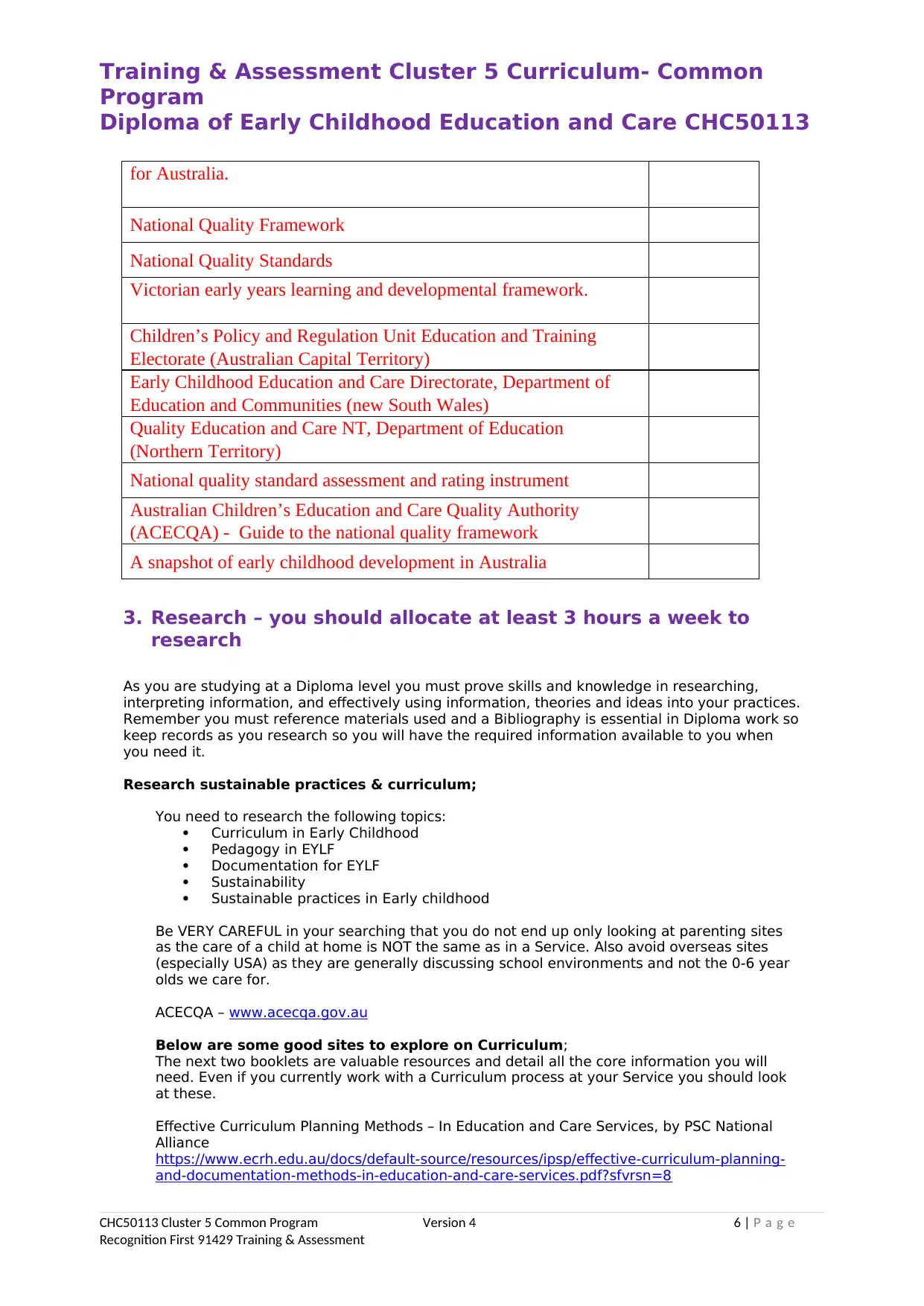
Training & Assessment Cluster 5 Curriculum- Common
Program
Diploma of Early Childhood Education and Care CHC50113
for Australia.
National Quality Framework
National Quality Standards
Victorian early years learning and developmental framework.
Children’s Policy and Regulation Unit Education and Training
Electorate (Australian Capital Territory)
Early Childhood Education and Care Directorate, Department of
Education and Communities (new South Wales)
Quality Education and Care NT, Department of Education
(Northern Territory)
National quality standard assessment and rating instrument
Australian Children’s Education and Care Quality Authority
(ACECQA) - Guide to the national quality framework
A snapshot of early childhood development in Australia
3. Research – you should allocate at least 3 hours a week to
research
As you are studying at a Diploma level you must prove skills and knowledge in researching,
interpreting information, and effectively using information, theories and ideas into your practices.
Remember you must reference materials used and a Bibliography is essential in Diploma work so
keep records as you research so you will have the required information available to you when
you need it.
Research sustainable practices & curriculum;
You need to research the following topics:
Curriculum in Early Childhood
Pedagogy in EYLF
Documentation for EYLF
Sustainability
Sustainable practices in Early childhood
Be VERY CAREFUL in your searching that you do not end up only looking at parenting sites
as the care of a child at home is NOT the same as in a Service. Also avoid overseas sites
(especially USA) as they are generally discussing school environments and not the 0-6 year
olds we care for.
ACECQA – www.acecqa.gov.au
Below are some good sites to explore on Curriculum;
The next two booklets are valuable resources and detail all the core information you will
need. Even if you currently work with a Curriculum process at your Service you should look
at these.
Effective Curriculum Planning Methods – In Education and Care Services, by PSC National
Alliance
https://www.ecrh.edu.au/docs/default-source/resources/ipsp/effective-curriculum-planning-
and-documentation-methods-in-education-and-care-services.pdf?sfvrsn=8
CHC50113 Cluster 5 Common Program Version 4 6 | P a g e
Recognition First 91429 Training & Assessment
Program
Diploma of Early Childhood Education and Care CHC50113
for Australia.
National Quality Framework
National Quality Standards
Victorian early years learning and developmental framework.
Children’s Policy and Regulation Unit Education and Training
Electorate (Australian Capital Territory)
Early Childhood Education and Care Directorate, Department of
Education and Communities (new South Wales)
Quality Education and Care NT, Department of Education
(Northern Territory)
National quality standard assessment and rating instrument
Australian Children’s Education and Care Quality Authority
(ACECQA) - Guide to the national quality framework
A snapshot of early childhood development in Australia
3. Research – you should allocate at least 3 hours a week to
research
As you are studying at a Diploma level you must prove skills and knowledge in researching,
interpreting information, and effectively using information, theories and ideas into your practices.
Remember you must reference materials used and a Bibliography is essential in Diploma work so
keep records as you research so you will have the required information available to you when
you need it.
Research sustainable practices & curriculum;
You need to research the following topics:
Curriculum in Early Childhood
Pedagogy in EYLF
Documentation for EYLF
Sustainability
Sustainable practices in Early childhood
Be VERY CAREFUL in your searching that you do not end up only looking at parenting sites
as the care of a child at home is NOT the same as in a Service. Also avoid overseas sites
(especially USA) as they are generally discussing school environments and not the 0-6 year
olds we care for.
ACECQA – www.acecqa.gov.au
Below are some good sites to explore on Curriculum;
The next two booklets are valuable resources and detail all the core information you will
need. Even if you currently work with a Curriculum process at your Service you should look
at these.
Effective Curriculum Planning Methods – In Education and Care Services, by PSC National
Alliance
https://www.ecrh.edu.au/docs/default-source/resources/ipsp/effective-curriculum-planning-
and-documentation-methods-in-education-and-care-services.pdf?sfvrsn=8
CHC50113 Cluster 5 Common Program Version 4 6 | P a g e
Recognition First 91429 Training & Assessment
⊘ This is a preview!⊘
Do you want full access?
Subscribe today to unlock all pages.

Trusted by 1+ million students worldwide
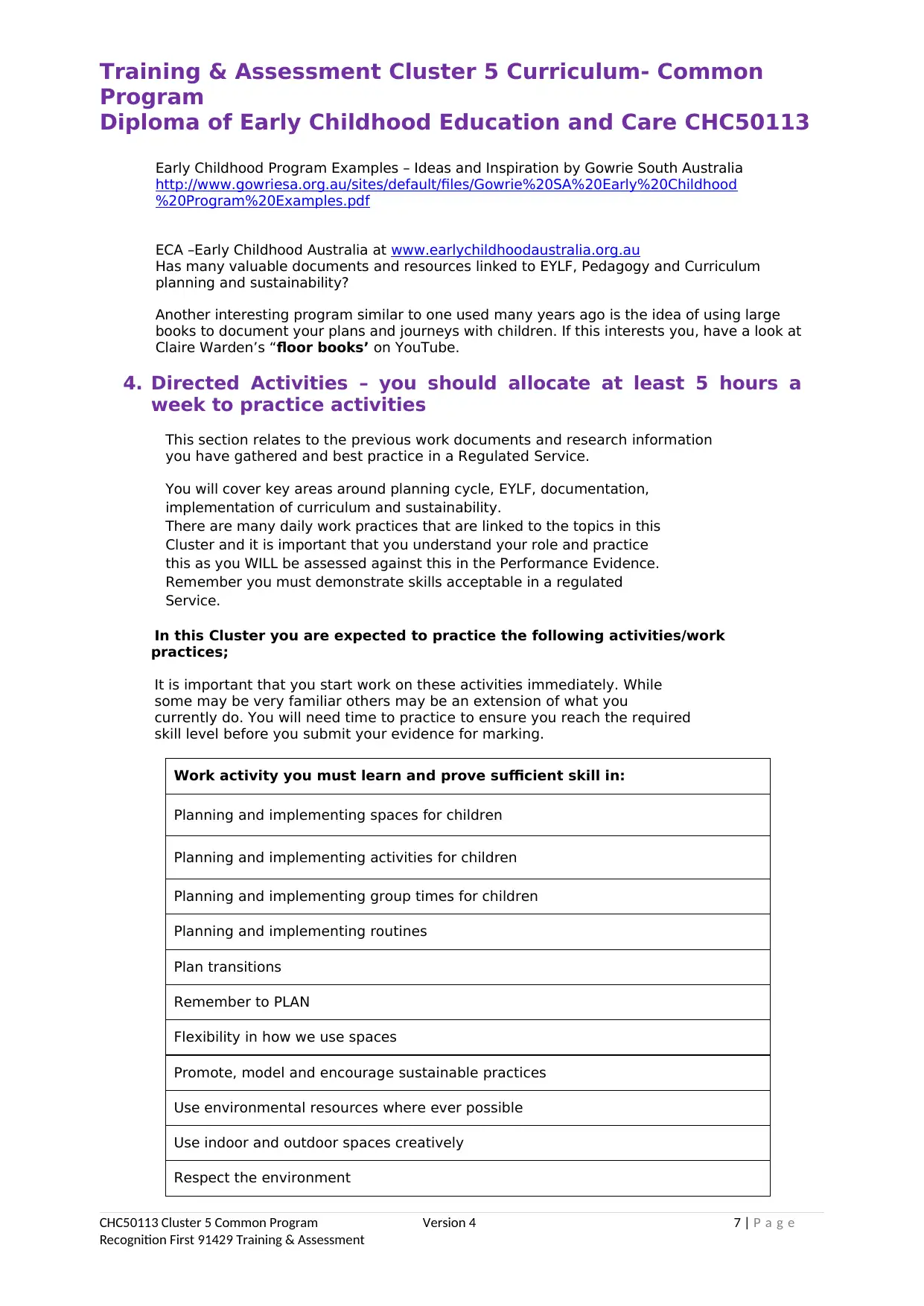
Training & Assessment Cluster 5 Curriculum- Common
Program
Diploma of Early Childhood Education and Care CHC50113
Early Childhood Program Examples – Ideas and Inspiration by Gowrie South Australia
http://www.gowriesa.org.au/sites/default/files/Gowrie%20SA%20Early%20Childhood
%20Program%20Examples.pdf
ECA –Early Childhood Australia at www.earlychildhoodaustralia.org.au
Has many valuable documents and resources linked to EYLF, Pedagogy and Curriculum
planning and sustainability?
Another interesting program similar to one used many years ago is the idea of using large
books to document your plans and journeys with children. If this interests you, have a look at
Claire Warden’s “floor books’ on YouTube.
4. Directed Activities – you should allocate at least 5 hours a
week to practice activities
This section relates to the previous work documents and research information
you have gathered and best practice in a Regulated Service.
You will cover key areas around planning cycle, EYLF, documentation,
implementation of curriculum and sustainability.
There are many daily work practices that are linked to the topics in this
Cluster and it is important that you understand your role and practice
this as you WILL be assessed against this in the Performance Evidence.
Remember you must demonstrate skills acceptable in a regulated
Service.
In this Cluster you are expected to practice the following activities/work
practices;
It is important that you start work on these activities immediately. While
some may be very familiar others may be an extension of what you
currently do. You will need time to practice to ensure you reach the required
skill level before you submit your evidence for marking.
Work activity you must learn and prove sufficient skill in:
Planning and implementing spaces for children
Planning and implementing activities for children
Planning and implementing group times for children
Planning and implementing routines
Plan transitions
Remember to PLAN
Flexibility in how we use spaces
Promote, model and encourage sustainable practices
Use environmental resources where ever possible
Use indoor and outdoor spaces creatively
Respect the environment
CHC50113 Cluster 5 Common Program Version 4 7 | P a g e
Recognition First 91429 Training & Assessment
Program
Diploma of Early Childhood Education and Care CHC50113
Early Childhood Program Examples – Ideas and Inspiration by Gowrie South Australia
http://www.gowriesa.org.au/sites/default/files/Gowrie%20SA%20Early%20Childhood
%20Program%20Examples.pdf
ECA –Early Childhood Australia at www.earlychildhoodaustralia.org.au
Has many valuable documents and resources linked to EYLF, Pedagogy and Curriculum
planning and sustainability?
Another interesting program similar to one used many years ago is the idea of using large
books to document your plans and journeys with children. If this interests you, have a look at
Claire Warden’s “floor books’ on YouTube.
4. Directed Activities – you should allocate at least 5 hours a
week to practice activities
This section relates to the previous work documents and research information
you have gathered and best practice in a Regulated Service.
You will cover key areas around planning cycle, EYLF, documentation,
implementation of curriculum and sustainability.
There are many daily work practices that are linked to the topics in this
Cluster and it is important that you understand your role and practice
this as you WILL be assessed against this in the Performance Evidence.
Remember you must demonstrate skills acceptable in a regulated
Service.
In this Cluster you are expected to practice the following activities/work
practices;
It is important that you start work on these activities immediately. While
some may be very familiar others may be an extension of what you
currently do. You will need time to practice to ensure you reach the required
skill level before you submit your evidence for marking.
Work activity you must learn and prove sufficient skill in:
Planning and implementing spaces for children
Planning and implementing activities for children
Planning and implementing group times for children
Planning and implementing routines
Plan transitions
Remember to PLAN
Flexibility in how we use spaces
Promote, model and encourage sustainable practices
Use environmental resources where ever possible
Use indoor and outdoor spaces creatively
Respect the environment
CHC50113 Cluster 5 Common Program Version 4 7 | P a g e
Recognition First 91429 Training & Assessment
Paraphrase This Document
Need a fresh take? Get an instant paraphrase of this document with our AI Paraphraser
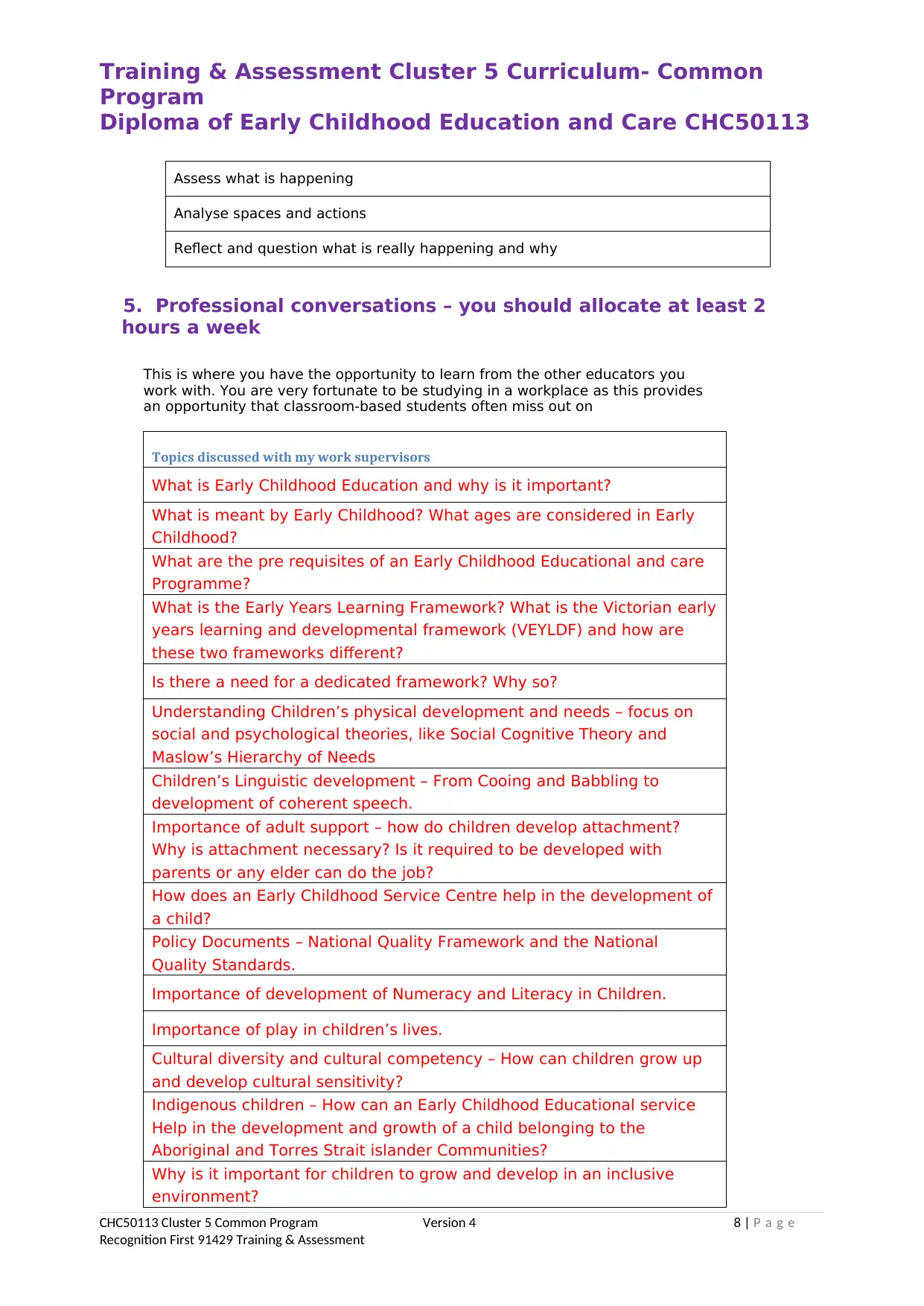
Training & Assessment Cluster 5 Curriculum- Common
Program
Diploma of Early Childhood Education and Care CHC50113
Assess what is happening
Analyse spaces and actions
Reflect and question what is really happening and why
5. Professional conversations – you should allocate at least 2
hours a week
This is where you have the opportunity to learn from the other educators you
work with. You are very fortunate to be studying in a workplace as this provides
an opportunity that classroom-based students often miss out on
Topics discussed with my work supervisors
What is Early Childhood Education and why is it important?
What is meant by Early Childhood? What ages are considered in Early
Childhood?
What are the pre requisites of an Early Childhood Educational and care
Programme?
What is the Early Years Learning Framework? What is the Victorian early
years learning and developmental framework (VEYLDF) and how are
these two frameworks different?
Is there a need for a dedicated framework? Why so?
Understanding Children’s physical development and needs – focus on
social and psychological theories, like Social Cognitive Theory and
Maslow’s Hierarchy of Needs
Children’s Linguistic development – From Cooing and Babbling to
development of coherent speech.
Importance of adult support – how do children develop attachment?
Why is attachment necessary? Is it required to be developed with
parents or any elder can do the job?
How does an Early Childhood Service Centre help in the development of
a child?
Policy Documents – National Quality Framework and the National
Quality Standards.
Importance of development of Numeracy and Literacy in Children.
Importance of play in children’s lives.
Cultural diversity and cultural competency – How can children grow up
and develop cultural sensitivity?
Indigenous children – How can an Early Childhood Educational service
Help in the development and growth of a child belonging to the
Aboriginal and Torres Strait islander Communities?
Why is it important for children to grow and develop in an inclusive
environment?
CHC50113 Cluster 5 Common Program Version 4 8 | P a g e
Recognition First 91429 Training & Assessment
Program
Diploma of Early Childhood Education and Care CHC50113
Assess what is happening
Analyse spaces and actions
Reflect and question what is really happening and why
5. Professional conversations – you should allocate at least 2
hours a week
This is where you have the opportunity to learn from the other educators you
work with. You are very fortunate to be studying in a workplace as this provides
an opportunity that classroom-based students often miss out on
Topics discussed with my work supervisors
What is Early Childhood Education and why is it important?
What is meant by Early Childhood? What ages are considered in Early
Childhood?
What are the pre requisites of an Early Childhood Educational and care
Programme?
What is the Early Years Learning Framework? What is the Victorian early
years learning and developmental framework (VEYLDF) and how are
these two frameworks different?
Is there a need for a dedicated framework? Why so?
Understanding Children’s physical development and needs – focus on
social and psychological theories, like Social Cognitive Theory and
Maslow’s Hierarchy of Needs
Children’s Linguistic development – From Cooing and Babbling to
development of coherent speech.
Importance of adult support – how do children develop attachment?
Why is attachment necessary? Is it required to be developed with
parents or any elder can do the job?
How does an Early Childhood Service Centre help in the development of
a child?
Policy Documents – National Quality Framework and the National
Quality Standards.
Importance of development of Numeracy and Literacy in Children.
Importance of play in children’s lives.
Cultural diversity and cultural competency – How can children grow up
and develop cultural sensitivity?
Indigenous children – How can an Early Childhood Educational service
Help in the development and growth of a child belonging to the
Aboriginal and Torres Strait islander Communities?
Why is it important for children to grow and develop in an inclusive
environment?
CHC50113 Cluster 5 Common Program Version 4 8 | P a g e
Recognition First 91429 Training & Assessment
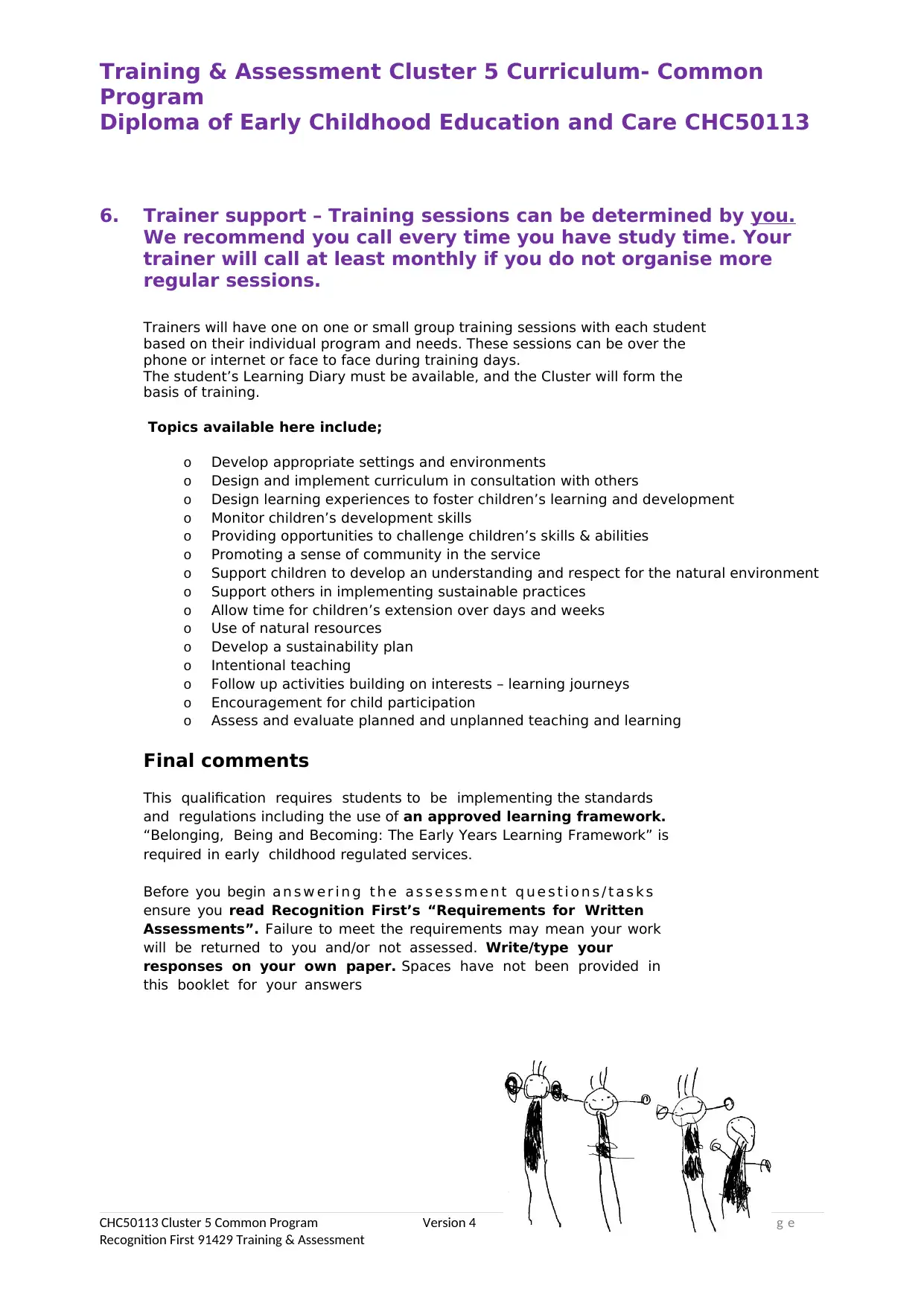
Training & Assessment Cluster 5 Curriculum- Common
Program
Diploma of Early Childhood Education and Care CHC50113
6. Trainer support – Training sessions can be determined by you.
We recommend you call every time you have study time. Your
trainer will call at least monthly if you do not organise more
regular sessions.
Trainers will have one on one or small group training sessions with each student
based on their individual program and needs. These sessions can be over the
phone or internet or face to face during training days.
The student’s Learning Diary must be available, and the Cluster will form the
basis of training.
Topics available here include;
o Develop appropriate settings and environments
o Design and implement curriculum in consultation with others
o Design learning experiences to foster children’s learning and development
o Monitor children’s development skills
o Providing opportunities to challenge children’s skills & abilities
o Promoting a sense of community in the service
o Support children to develop an understanding and respect for the natural environment
o Support others in implementing sustainable practices
o Allow time for children’s extension over days and weeks
o Use of natural resources
o Develop a sustainability plan
o Intentional teaching
o Follow up activities building on interests – learning journeys
o Encouragement for child participation
o Assess and evaluate planned and unplanned teaching and learning
Final comments
This qualification requires students to be implementing the standards
and regulations including the use of an approved learning framework.
“Belonging, Being and Becoming: The Early Years Learning Framework” is
required in early childhood regulated services.
Before you begin a n s w e r i n g t h e a s s e s s m e n t q u e s t i o n s / t a s k s
ensure you read Recognition First’s “Requirements for Written
Assessments”. Failure to meet the requirements may mean your work
will be returned to you and/or not assessed. Write/type your
responses on your own paper. Spaces have not been provided in
this booklet for your answers
CHC50113 Cluster 5 Common Program Version 4 9 | P a g e
Recognition First 91429 Training & Assessment
Program
Diploma of Early Childhood Education and Care CHC50113
6. Trainer support – Training sessions can be determined by you.
We recommend you call every time you have study time. Your
trainer will call at least monthly if you do not organise more
regular sessions.
Trainers will have one on one or small group training sessions with each student
based on their individual program and needs. These sessions can be over the
phone or internet or face to face during training days.
The student’s Learning Diary must be available, and the Cluster will form the
basis of training.
Topics available here include;
o Develop appropriate settings and environments
o Design and implement curriculum in consultation with others
o Design learning experiences to foster children’s learning and development
o Monitor children’s development skills
o Providing opportunities to challenge children’s skills & abilities
o Promoting a sense of community in the service
o Support children to develop an understanding and respect for the natural environment
o Support others in implementing sustainable practices
o Allow time for children’s extension over days and weeks
o Use of natural resources
o Develop a sustainability plan
o Intentional teaching
o Follow up activities building on interests – learning journeys
o Encouragement for child participation
o Assess and evaluate planned and unplanned teaching and learning
Final comments
This qualification requires students to be implementing the standards
and regulations including the use of an approved learning framework.
“Belonging, Being and Becoming: The Early Years Learning Framework” is
required in early childhood regulated services.
Before you begin a n s w e r i n g t h e a s s e s s m e n t q u e s t i o n s / t a s k s
ensure you read Recognition First’s “Requirements for Written
Assessments”. Failure to meet the requirements may mean your work
will be returned to you and/or not assessed. Write/type your
responses on your own paper. Spaces have not been provided in
this booklet for your answers
CHC50113 Cluster 5 Common Program Version 4 9 | P a g e
Recognition First 91429 Training & Assessment
⊘ This is a preview!⊘
Do you want full access?
Subscribe today to unlock all pages.

Trusted by 1+ million students worldwide
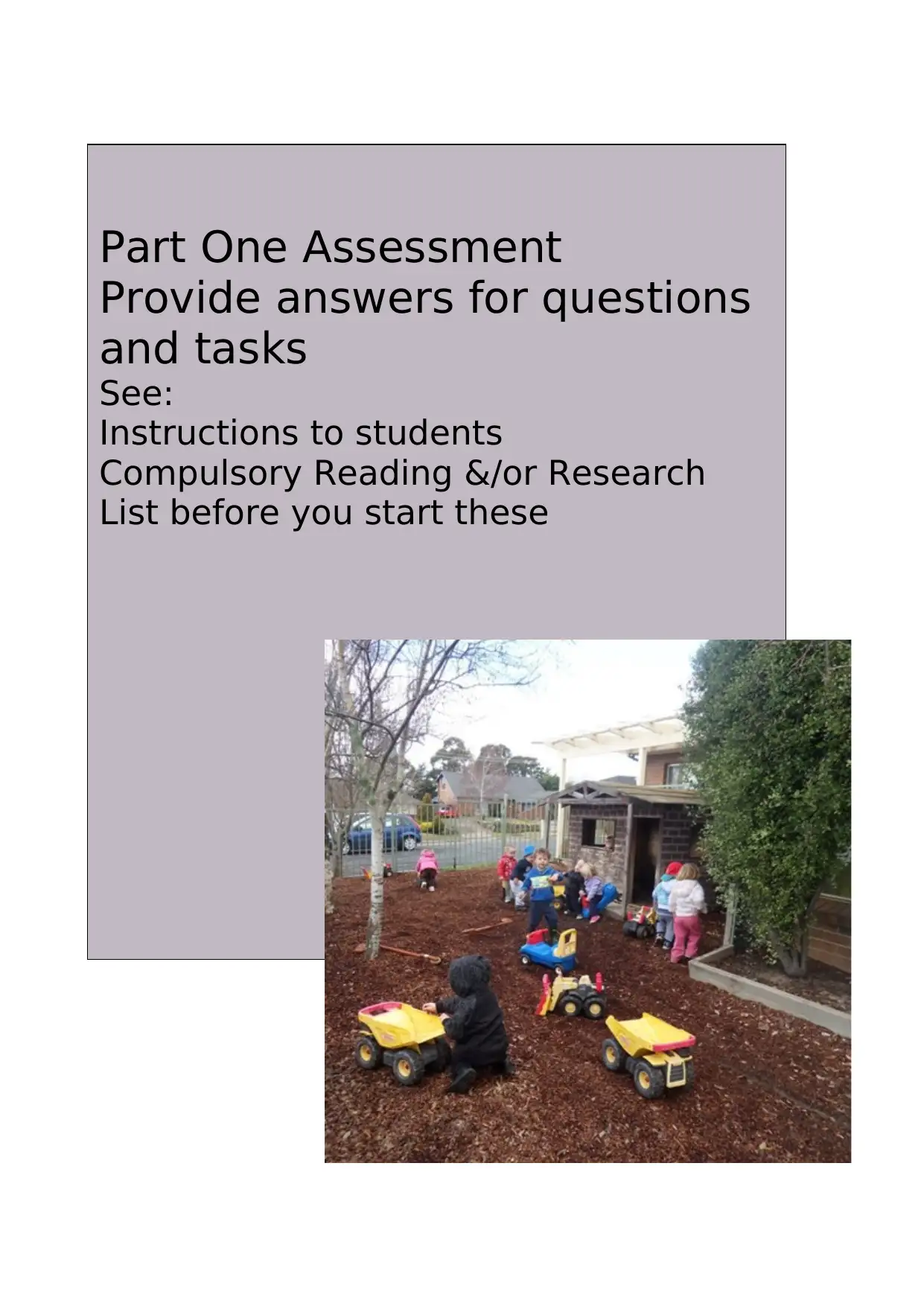
Part One Assessment
Provide answers for questions
and tasks
See:
Instructions to students
Compulsory Reading &/or Research
List before you start these
Provide answers for questions
and tasks
See:
Instructions to students
Compulsory Reading &/or Research
List before you start these
Paraphrase This Document
Need a fresh take? Get an instant paraphrase of this document with our AI Paraphraser
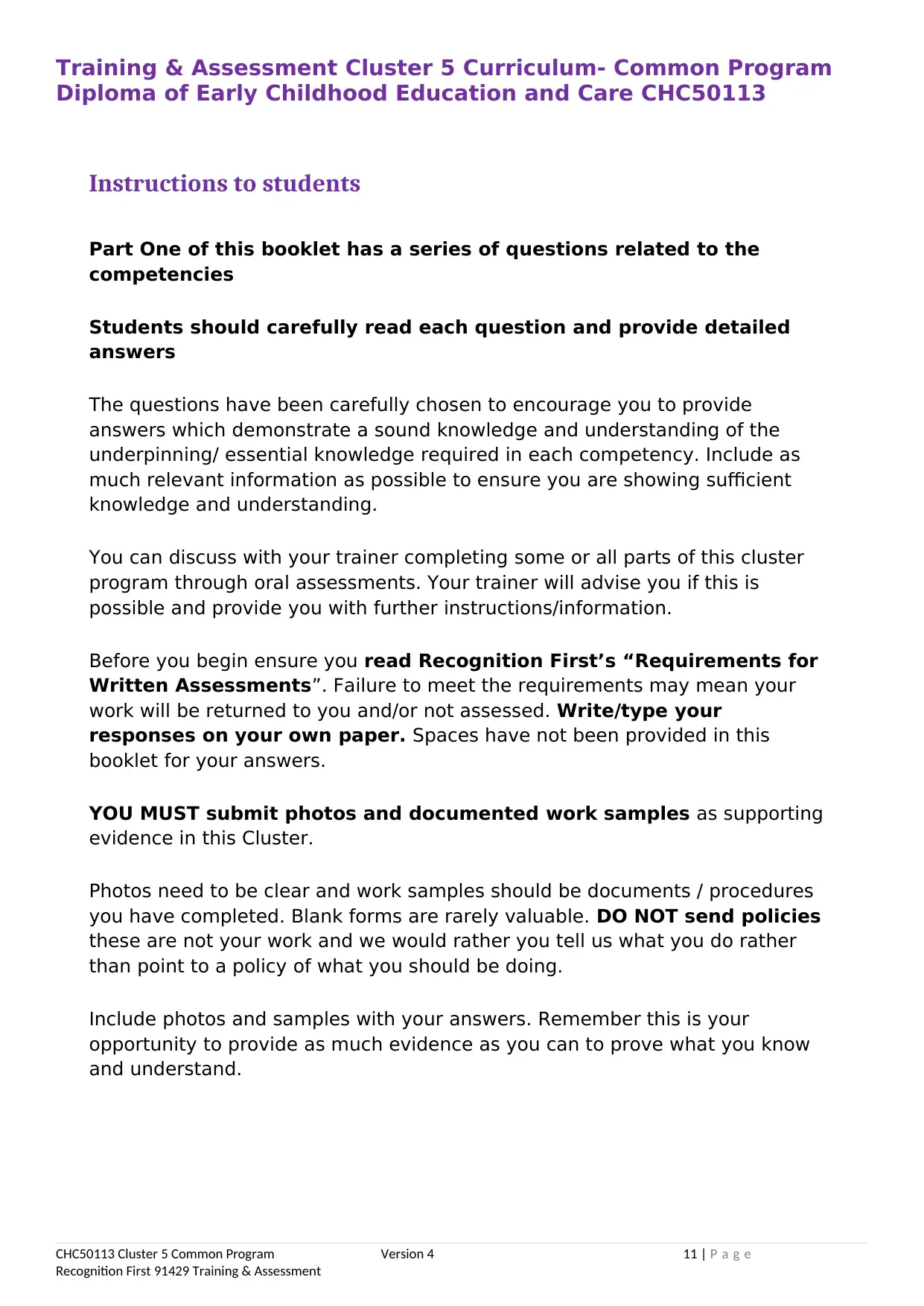
Training & Assessment Cluster 5 Curriculum- Common Program
Diploma of Early Childhood Education and Care CHC50113
Instructions to students
Part One of this booklet has a series of questions related to the
competencies
Students should carefully read each question and provide detailed
answers
The questions have been carefully chosen to encourage you to provide
answers which demonstrate a sound knowledge and understanding of the
underpinning/ essential knowledge required in each competency. Include as
much relevant information as possible to ensure you are showing sufficient
knowledge and understanding.
You can discuss with your trainer completing some or all parts of this cluster
program through oral assessments. Your trainer will advise you if this is
possible and provide you with further instructions/information.
Before you begin ensure you read Recognition First’s “Requirements for
Written Assessments”. Failure to meet the requirements may mean your
work will be returned to you and/or not assessed. Write/type your
responses on your own paper. Spaces have not been provided in this
booklet for your answers.
YOU MUST submit photos and documented work samples as supporting
evidence in this Cluster.
Photos need to be clear and work samples should be documents / procedures
you have completed. Blank forms are rarely valuable. DO NOT send policies
these are not your work and we would rather you tell us what you do rather
than point to a policy of what you should be doing.
Include photos and samples with your answers. Remember this is your
opportunity to provide as much evidence as you can to prove what you know
and understand.
CHC50113 Cluster 5 Common Program Version 4 11 | P a g e
Recognition First 91429 Training & Assessment
Diploma of Early Childhood Education and Care CHC50113
Instructions to students
Part One of this booklet has a series of questions related to the
competencies
Students should carefully read each question and provide detailed
answers
The questions have been carefully chosen to encourage you to provide
answers which demonstrate a sound knowledge and understanding of the
underpinning/ essential knowledge required in each competency. Include as
much relevant information as possible to ensure you are showing sufficient
knowledge and understanding.
You can discuss with your trainer completing some or all parts of this cluster
program through oral assessments. Your trainer will advise you if this is
possible and provide you with further instructions/information.
Before you begin ensure you read Recognition First’s “Requirements for
Written Assessments”. Failure to meet the requirements may mean your
work will be returned to you and/or not assessed. Write/type your
responses on your own paper. Spaces have not been provided in this
booklet for your answers.
YOU MUST submit photos and documented work samples as supporting
evidence in this Cluster.
Photos need to be clear and work samples should be documents / procedures
you have completed. Blank forms are rarely valuable. DO NOT send policies
these are not your work and we would rather you tell us what you do rather
than point to a policy of what you should be doing.
Include photos and samples with your answers. Remember this is your
opportunity to provide as much evidence as you can to prove what you know
and understand.
CHC50113 Cluster 5 Common Program Version 4 11 | P a g e
Recognition First 91429 Training & Assessment
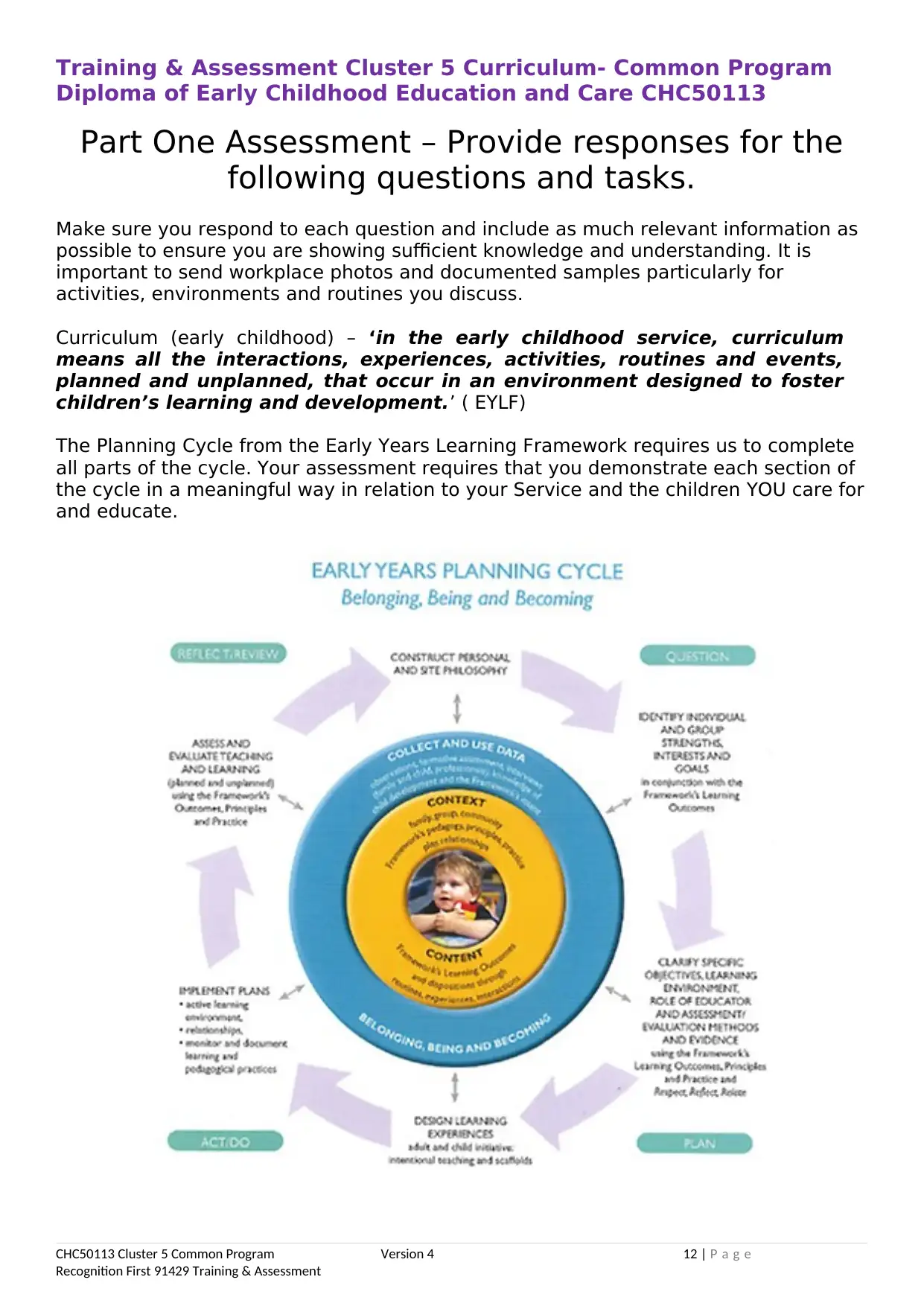
Training & Assessment Cluster 5 Curriculum- Common Program
Diploma of Early Childhood Education and Care CHC50113
Part One Assessment – Provide responses for the
following questions and tasks.
Make sure you respond to each question and include as much relevant information as
possible to ensure you are showing sufficient knowledge and understanding. It is
important to send workplace photos and documented samples particularly for
activities, environments and routines you discuss.
Curriculum (early childhood) – ‘in the early childhood service, curriculum
means all the interactions, experiences, activities, routines and events,
planned and unplanned, that occur in an environment designed to foster
children’s learning and development.’ ( EYLF)
The Planning Cycle from the Early Years Learning Framework requires us to complete
all parts of the cycle. Your assessment requires that you demonstrate each section of
the cycle in a meaningful way in relation to your Service and the children YOU care for
and educate.
CHC50113 Cluster 5 Common Program Version 4 12 | P a g e
Recognition First 91429 Training & Assessment
Diploma of Early Childhood Education and Care CHC50113
Part One Assessment – Provide responses for the
following questions and tasks.
Make sure you respond to each question and include as much relevant information as
possible to ensure you are showing sufficient knowledge and understanding. It is
important to send workplace photos and documented samples particularly for
activities, environments and routines you discuss.
Curriculum (early childhood) – ‘in the early childhood service, curriculum
means all the interactions, experiences, activities, routines and events,
planned and unplanned, that occur in an environment designed to foster
children’s learning and development.’ ( EYLF)
The Planning Cycle from the Early Years Learning Framework requires us to complete
all parts of the cycle. Your assessment requires that you demonstrate each section of
the cycle in a meaningful way in relation to your Service and the children YOU care for
and educate.
CHC50113 Cluster 5 Common Program Version 4 12 | P a g e
Recognition First 91429 Training & Assessment
⊘ This is a preview!⊘
Do you want full access?
Subscribe today to unlock all pages.

Trusted by 1+ million students worldwide
1 out of 31
Related Documents
Your All-in-One AI-Powered Toolkit for Academic Success.
+13062052269
info@desklib.com
Available 24*7 on WhatsApp / Email
![[object Object]](/_next/static/media/star-bottom.7253800d.svg)
Unlock your academic potential
Copyright © 2020–2026 A2Z Services. All Rights Reserved. Developed and managed by ZUCOL.





